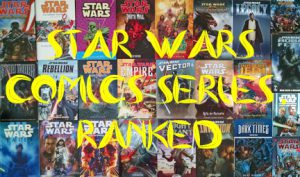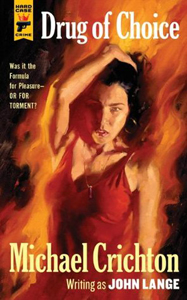“Drug of Choice” (1970), the sixth John Lange book, can be described as John Lange meets Michael Crichton. It has the dime-store plotting and short page count (208) of a Lange, but the imaginative sci-fi warnings of a Crichton.
A precursor to ‘Coma’
This book wasn’t made into a movie, but Crichton later wrote and directed “Coma” (1978), based on Robin Cook’s novel. Both stories start as a medical mystery about inexplicable comas. In this case, patients’ urine is blue, and they wake up refreshed, as if they were merely sleeping.
Then both “Coma” and “Drug of Choice” go deeper into a huge conspiracy. This one is so imaginative that I don’t want to spoil too much.

“Drug of Choice” (1970)
Also published as: “Overkill”
Author: Michael Crichton (as John Lange)
Series: John Lange No. 6
Genre: Pulp sci-fi thriller
Settings: Los Angeles and a Caribbean island, 1970
Like all Lange protagonists, Dr. Roger Clark has stuff happen to him rather than instigating the action, and he fights back as best he can. That’s not a criticism in this case, because no one could prepare for this situation.
This is the most Phil Dickian of Crichton’s early work. In fact, it predates “Flow My Tears, the Policeman Said” – also about multiple realities (or the perception thereof) – by four years. Crichton won’t get this weird again until 2006’s “Next.”
Clark is hired by a pharmaceutical startup, Advance Biosystems, that he never applied at and didn’t even know existed. But it pays well and sounds exciting both from a perspective of those heady times and today. Advance does scientific experiments on various natural substances, aiming for commercial applications.
Rise of the mega-corporation
Of course, Crichton will return to mega-corporations with “Jurassic Park’s” InGen and BioSyn and others, but Clark and the reader get a front-row seat here.
Crichton explores drugs that change one’s perception of reality and he shows how the powerful corporation takes advantage of it. “Drug of Choice” smoothly slots into the 1970s corporate paranoia aesthetic as Roger doesn’t know who to trust.
The author stays on this side of plausible. To complement the sci-fi, he peppers in many grounded concerns, notably addiction. In a segment that remains valid in today’s era of corporatist-caused opioid addiction, a pharma industry seller drops by Clark’s apartment with samples of the latest wonder drugs. Clark wisely flushes the samples down the toilet.
Crichton also digs into manipulation of a person’s psyche without the use of drugs. Clark’s experience calls to mind black-site torture of prisoners (although it’s more fascinating than tortuous to read). Clark’s enemies combine sensory deprivation with audio manipulation. He emerges from the room a pliable person – and he’s happy about it.

In the end, “Drug of Choice” is more about the wild ride than the smart themes. Coming off his thickest book, “The Venom Business,” this one is rushed at the end – although it’s not as extreme as his next book, “Grave Descend.”
But considering it’s a cranked-out pulp novel, “Drug of Choice” takes a notable step toward serious literary value.

